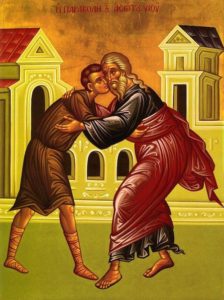
Click here for the text of Vespers, Orthros, and the Divine Liturgy variables.
Click here for the Typica service. (When reading Typica instead of attending Liturgy, you will need both the Typica and Divine Liturgy texts.)
Theme
The Sunday of the Prodigal Son is the second Sunday of the three week pre-Lenten period. The theme of this Sunday is repentance, and the focus on the parable of the Prodigal Son leads Orthodox Christians to contemplate the necessity of repentance in our relationship with our Heavenly Father.
Observance of the Week
For the week that follows the Sunday of the Prodigal Son, fasting is observed on Wednesday and Friday. This is the last week that meat is allowed on non-fasting days.
Biblical Story
The name for this Sunday is taken from the parable of our Lord Jesus Christ found in Luke 15:11-32. It is the story of a man and his two sons. The younger son asks his father to give him his inheritance. Soon after, the son leaves and journeys to a distant country (vv. 11-13). He squanders all of his possessions with “prodigal” living. Within a short period of time, he wastes everything. A severe famine comes, but he has nothing and falls into great need (vv. 13-14). He is able to find work feeding swine, but this does not improve his situation.
Eventually, he realized that his father’s hired servants have enough to eat and food to spare, while he perishes with hunger. He says, “I will arise and go to my father and will say to him, ‘Father, I have sinned against heaven and before you, and I am no longer worthy to be called your son. Make me like one of your hired servants’” (vv. 17-19).
He arose and returned to his father. As he approached, his father saw him at a great distance. The father had compassion on his son, ran to meet him, embraced him, and kissed him. The son admitted his sinfulness and his unworthiness to be called a son, but in his joy at the return of his son, the father called his servants to bring gifts and prepare a feast. He exclaimed, “For this my son was dead and is alive again; he was lost and is found” (vv. 20-24).
During the feast, the older son becomes angry at the celebration of his brother. The father responds by telling his oldest son, “You are always with me, and all that I have is yours. It was right that we should make merry and be glad, for your brother was dead and is alive again, and was lost and is found” (vv. 31-32).
In the words of our Lord, we learn three things through this parable: the condition of the sinner, the rule of repentance, and the greatness of God’s compassion. The reading of this parable follows the Sunday of the Publican and the Pharisee so that, seeing in the person of the Prodigal Son our own sinful condition, we might come to our senses and return to God through repentance. For those who have fallen into great despair over their sins thinking that there is no forgiveness, this parable offers hope. The Heavenly Father is patiently and lovingly waiting for our return. There is no sin that can overcome His love for us.
The Icon
The icon of the Sunday of the Prodigal Son shows the prodigal being received by his father upon his return. We are presented with an image of a warm and loving embrace, the son showing his need for his father, an attitude that represents repentance, love, and hope for renewal and restoration. The father is shown full of compassion for his son, having born the burden of his sin and suffering, but now filled with joy that he has returned.